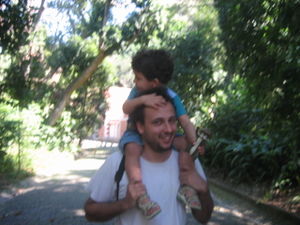Bruno Mota
From Santa Fe Institute Events Wiki
Hi everyone! My name is Bruno Mota, and I'm a Brazilian physicist currently living in Rio.
Inside the Lab
After finishing my PhD on cosmology, I started a Postdoc in... Comparative neuroanatomy, at the Universidade Federal do Rio de Janeiro. I work on a lab that measures various quantities (neuron and glia numbers, mass, surface area, etc.) in central nervous system substructures (e.g., cortex, cerebellum, spinal cord), and my job is to try to make some sense out of it. More specifically, we want to find out the general construction rules (if any) for mammalian brains that hold across different species and orders, and relate them to the various adaptative optimizations and trade offs that should exist for brain connectivity, computing power, metabolic rate and information throughput. Since the CNS structures we have studied vary, in both mass and number of neurons, by more than 5 orders of magnitude, we are able to separate truly universal features from species-specific adaptation. It is no surprise then that the universal features we observe are usually described by power law (i.e., scale-invariant) relations, and that fractal structures and self-similar patterns are ubiquitous.
What I find the most exciting about this field is that we are presented with a wealth of quantitative data about a diverse set of intriguing problems, for which often no descriptive framework currently exists. I'm then able to reach deep into the physicist toolkit for the right tools and concepts to try to gain a better understanding. Although we have been at it for only about six months, so far we have already (quite agnostically) observed (or saw hints of) scaling laws, functional optimization, fractal structures, self-organized criticality and small-world networks, in various aspects of CNS structure, compared across species.
Brain development, evolution and activity, in general, and intelligence, in particular, are the quintessential complex emergent phenomena. I therefore can think of no better venue to gain new insights into these phenomena than this Bariloche school. Hopefully I might even be able to contribute a few insights of my own ;^). In any case, I'm honored to be part of it, and I'm looking forward to meeting you all.
Outside the lab
I have a long and idiosyncratic list of interests which, despite my love of cycling and trekking, tend heavily and unapologeticaly to the nerdy end of the spectrum. If you want to know what exactly I mean by that, I suggest you check out my blog, Lounge. I expect that the people who participate in a complex systems schools ought to be a pretty interesting crowd. I'm honored to be part of it, and I'm looking forward to meeting you all.

